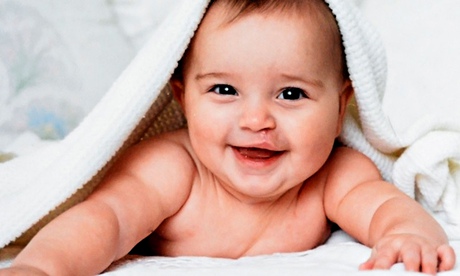
In early pregnancy, the foetus grows areas of the face separately that then join together. If they don't fuse properly, the result is a cleft – which can affect the palate, lip or both. Although the rate of occurrence of cleft lip and palate – one in 700 UK babies – isn't increasing, the number of surgeries is.
One reason for the rise is that more babies are being correctly diagnosed. Midwives are routinely using the "finger sweep" to check for this anomaly, so they can feel it even if they can't see it.
"Another reason is that with the specialisation of cleft services, patients are given more treatment options, including surgery," explains Rosanna Preston, CEO of the Cleft Lip and Palate Association (Clapa). "Just over 10 years ago, treatment began to be carried out by cleft teams which were established in central hospitals, rather than by surgeons in local hospitals." Because everyone in the cleft team is a specialist, surgeries are better and so are followup checks, which might lead to further surgeries to improve the outcome.
Surgery in adults is also contributing to the increase. "Adults who may have received sub-par repair surgeries as children are now realising that they can return for further treatment," Preston adds.
But is more surgery a good thing? "There is a balance to be struck," says Mark Devlin, consultant maxillofacial and cleft surgeon, and fellow of the Royal College of Surgeons in Edinburgh, "between getting close to the optimal result in terms of aesthetics and functionality, and overburdening a family and their child with healthcare.
"Ideally, we would want a child to look and sound as if they'd never had a cleft palate or lip in the first place. But what is more important is a happy, well-adjusted child. So it's not a case of saying to a family: here's a list of things we should do. It's 'could' do. We need to be led by them."
Jenny King's daughter Maisie, four, was born with a cleft palate in 2010. "The first time a faint alarm bell rang was when Maisie couldn't latch on to breastfeed after she was born. But her older brother Riley didn't feed well to start with either, so I dismissed it."
Maisie's cleft palate was spotted when she had her first set of checks in hospital. "I couldn't take it in," says Jenny. "They went to get the consultant and I thought: he'll come in and say it's a mistake. But he didn't.
"I was bewildered – I didn't know what it would mean for Maisie, for me, for any of us." But there was a more pressing issue. Maisie was now 24 hours old and still hadn't fed, so she was taken to the special care unit.
The next day, Jenny saw a nurse who specialised in cleft palates, who reassured her. "I started to take in what we were dealing with and that's when I pulled myself together. This is my baby, I thought – we can do this."
Maisie had her first operation at six months old. "Then we got to be 'normal' for a while, before Maisie started to learn to talk. She only had two consonants, 'm' and 'n'." Maisie's speech has been monitored since she was 18 months old, with regular therapy from the age of two. She had another operation in December 2013, which Jenny prepared her for using the Monkey Wellbeing book series.
"Since then her speech has come along brilliantly," explains Jenny. "But it has definitely affected her confidence – she finds it hard to form friendships and doesn't like meeting new adults, as she predicts that they won't understand her.
"Like any child, she needs cuddles and reassurance – but just more of both. It's hard when she tells me: 'I want to talk like Riley.' But seeing her in special care when she was born helped – there were babies there with much bigger problems. In a way, we've come off lightly."
David Nankivell knows firsthand how Maisie's care differs from what was available a few decades ago. He was born in 1972 with a cleft lip and palate, and had a series of operations as a baby, "but that was it. It was just expected to work."
By junior school, David was being dismissed as an underachiever, when in fact he couldn't hear very well as he had glue ear, a condition often associated with cleft lip and palate. He also had teeth that were "all over the place" and was picked on for his "hare lip".
"They were doing the best they could, but it was just patching up symptoms. They didn't see how my issues connected." Once David started work in the 1990s, he went for speech therapy, and in his 30s had a series of further corrective operations. He even saw a psychologist, something he had never done growing up.
"Finally, as an adult, I got the support I should have had as a child. I went to my 20-year school reunion recently. It was strange meeting people who had picked on me again. It made me realise things might have been different if I'd been born now with my cleft palate, but I think some of my drive comes from my experiences as a child. It has made me the person I am today."

